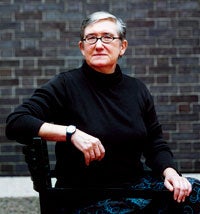The Association for the Study of Law, Culture and the Humanities has announced that Harvard Law Professor Janet Halley has been named the recipient of the James Boyd White Award.
The recognition is given annually to professors who have demonstrated a distinguished body of work from a “humanistic” perspective, and it honors “the originality and excellence of individual contributions to the field and their commitment to the interdisciplinary study of law, culture and the humanities.”
“Janet’s original and provocative work bridges the worlds of law and literary criticism. Her broad interests and remarkable insights enrich and challenge understandings of family law, personal identity, canonization of knowledge, and more,” said Dean Martha Minow. “We’re delighted to see her achievements so wonderfully recognized.”
Halley, Royal Professor of Law at HLS, is an expert on comparative family law, discrimination, law and literary theory, law and social theory, legal theory, and the regulation of sexuality. She is the author of several books, including “Split Decisions: How and Why To Take a Break From Feminism.” She has written many academic articles, and has been a contributor to various books and anthologies.
Before joining Harvard’s faculty in 2000, Halley was a professor of law at Stanford for almost ten years. She also taught English at Hamilton College from 1980 to 1985. She has a Ph.D. in English from UCLA (1980) and a J.D. from Yale Law School (1988).
The Association for the Study of Law, Culture and the Humanities, based out of Syracuse University School of Law, brings together a wide range of people engaged in scholarship on legal history, legal theory and jurisprudence, law and cultural studies, law and literature, law and the performing arts, and legal hermeneutics.
The association’s James Boyd White Award is named in honor of James Boyd White ’64, a law professor, literary critic, scholar and philosopher who currently serves as the Hart Wright Professor of Law Emeritus and Professor of English, Emeritus, at the University of Michigan. He is credited with founding the “Law and Literature” movement and is the preeminent proponent of the analysis of constitutive rhetoric in the analysis of legal texts.
